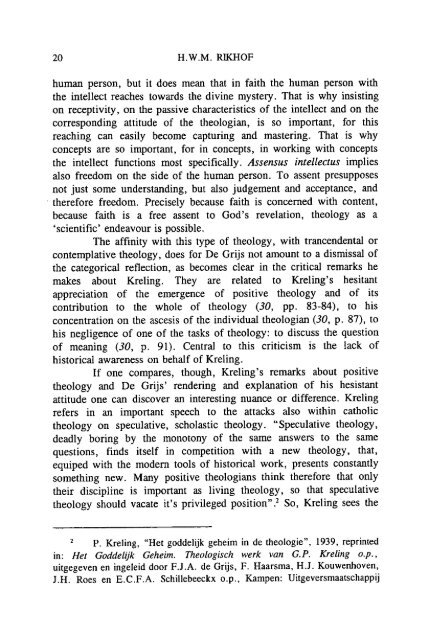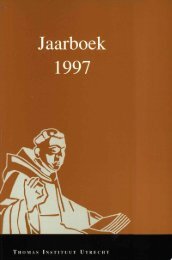Jaarboek Thomas Instituut 1995 - Thomas Instituut te Utrecht
Jaarboek Thomas Instituut 1995 - Thomas Instituut te Utrecht
Jaarboek Thomas Instituut 1995 - Thomas Instituut te Utrecht
You also want an ePaper? Increase the reach of your titles
YUMPU automatically turns print PDFs into web optimized ePapers that Google loves.
20 H.W.M. RIKHOF<br />
human person, but it does mean that in faith the human person with<br />
the in<strong>te</strong>llect reaches towards the divine mys<strong>te</strong>ry. That is why insisting<br />
on receptivity, on the passive charac<strong>te</strong>ristics of the in<strong>te</strong>llect and on the<br />
corresponding attitude of the theologian, is so important, for this<br />
reaching can easily become capturing and mas<strong>te</strong>ring. That is why<br />
concepts are so important, for in concepts, in working with concepts<br />
the in<strong>te</strong>llect functions most specifically. Assensus in<strong>te</strong>llectus implies<br />
also freedom on the side of the human person. To assent presupposes<br />
not just some understanding, but also judgement and acceptance, and<br />
therefore freedom. Precisely because faith is concerned with con<strong>te</strong>nt,<br />
because faith is a free assent to God's revelation, theology as a<br />
'scientific' endeavour is possible.<br />
The affinity with this type of theology, with trancendental or<br />
con<strong>te</strong>mplative theology, does for De Grijs not amount to a dismissal of<br />
the ca<strong>te</strong>gorical reflection, as becomes clear in the critical remarks he<br />
makes about Kreling. They are rela<strong>te</strong>d to Kreling's hesitant<br />
appreciation of the emergence of positive theology and of its<br />
contribution to the whole of theology (30, pp. 83-84), to his<br />
concentration on the ascesis of the individual theologian (30, p. 87), to<br />
his negligence of one of the tasks of theology: to discuss the question<br />
of meaning (30, p. 91). Central to this criticism is the lack of<br />
historical awareness on behalf of Kreling.<br />
If one compares, though, Kreling's remarks about positrve<br />
theology and De Grijs' rendering and explanation of his hesistant<br />
attitude one can discover an in<strong>te</strong>resting nuance or difference. Kreling<br />
refers in an important speech to the attacks also within catholic<br />
theology on speculative, scholastic theology. "Speculative theology,<br />
deadly boring by the monotony of the same answers to the same<br />
questions, finds itself in competition with a new theology, that,<br />
equiped with the modem tools of historical work, presents constantly<br />
something new. Many positive theologians think therefore that only<br />
their discipline is important as living theology, so that speculative<br />
theology should vaca<strong>te</strong> it's privileged position" _2 So, Kreling sees the<br />
P. Kreling, "Het goddelijk geheim in de theologie", 1939, reprin<strong>te</strong>d<br />
in: Het Goddelijk Geheim. Theologisch werk van G.P. Kreling o.p.,<br />
uitgegeven en ingeleid door F.J.A. de Grijs, F. Haarsma, H.I. Kouwenhoven,<br />
LH. Roes en E.C.F.A. Schillebeeckx o.p., Kampen: Uitgeversmaatschappij








